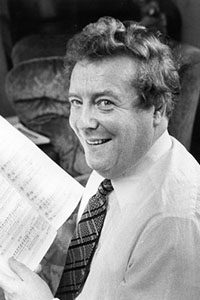The History of Stuart Burrows

Born: 7 February 1933
Welsh Tenor
Yes, at long last, a Welshman comes into our survey.
Only proper of course, that the valleys of Wales should produce an international star sometime, considering the number of wonderful male voice choirs, that are constantly produced by that little country.
Stuart Burrows was born near Pontypridd in 1933. And at the age of 10, made his first public appearance, as a boy soprano, in the children’s Christmas concert in his home village.
He studied at Trinity college, Carmarthen, and became a schoolteacher. His singing career started completely by accident.
One day, while listening to Guile singing Schubert’s Ave Maria on the radio, he found that he could accompany the great tenor with ease.
He began to enter and win competitive singing events, all over Wales.
Culminating in the winning of the Blue Riband at the 1959, National Eisteddfod.
Welsh Song – Stuart Burrows
Burrows was now in some demand.
And after some concerts, was invited to make his operatic debut with the Welsh National Opera company in 1963.
The role was an unusual one, Ishmael in Verdi’s opera, Nabucco lefe tignesa.
This initial success, led to appearances the following year in various operas, ranging from Donizetti’s Evisia Damore to Smetana’s the Bartered Bride, which he sang in Ireland.
He first appeared at Covent Garden in 1967, and his roles there, have included Fenton, Tamino, Don Ottavio, and Elvino in la Somnambule.
He never recorded his Elvino, but there was a broadcast direct from Covent Garden in 1967.
The ever-vigilant Eddie Findlay was on hand for this occasion.
So, we are able to hear him in one of his most famous roles with the added delight of discovering that his partner is the wonderful Renata Scotto.
Prendi L’anel w Scotto / Sonnambula / 1967 – Stuart Burrows
Burrows made his American debut in 1967 with the San Francisco opera, where he has returned regularly.
He sang at the Vienna State Opera in 1970 and made his debut at the metropolitan in 1972.
Mozart has been a particular favourite at all these houses and of course at Covent Garden.
Alan Blyth, the broadcaster, and music critic, writes….
Among tenors of recent years, Stuart Burrows has been noted for his pre-eminence as a Mozart singer.
His smooth and mellifluous voice, easily produced throughout a wide range, has proved near ideal for such parts as Tamino, Don Ottavio, Belmonte, and Ferando, and he has enhanced his singing of them by his thorough understanding, of what is meant by Mozartian style.
Avoiding aspirates and any kind of exaggeration and aiming at sweet, but never bland tone.His able technique has enabled him to encompass the runs in Don Ottavio’s il mio tesoro and in Dominao’s, Fiorid Fiore Del Mar with perfect breath control and the awkward line of Ferando’s Aloveggio.
An aria frequently omitted in performance because of these difficulties.
ah, Lo Veggio / c-Fan Tutte / 1976 – Stuart Burrows
In 1974, Burrows gave, what was described, as an ardent and finally molded performance of Lenski in Tchaikovsky’s Eugene Onegin, at Covent Garden.
And also took part in a new production of Faust there.
That same year, he joined the Boston forces under Ozawa, for Deutsch gramophones new recording of Berlioz’s, the Damnation of Faust.
Here is the Aria, Nature Immense from that recording.
Nature Immense / D-Faust / 1974 – Stuart Burrows
Stuart Burrows has been popular as an oratorio singer and was chosen by Stravinsky to sing in his Oedipus Rex under his personal direction.
Later in life, he became popular as a ballad singer, with his own TV programme but it is to the bel canto operas that I return to conclude, because I have always thought, his plangent timbre particularly suitable to this music.
In 1971, he recorded Donizetti’s, Maria Stuarda (Mary Stuart) with the Beverly Sills and Eileen Farrell as the two Queens.
Here he is, with that delicious soprano Beverly Sills.
Tutti Abbanadonata w Stills / M-Stuarda / 1971 – Stuart Burrows

The History as it was Recorded
Sydney Rhys Barker
